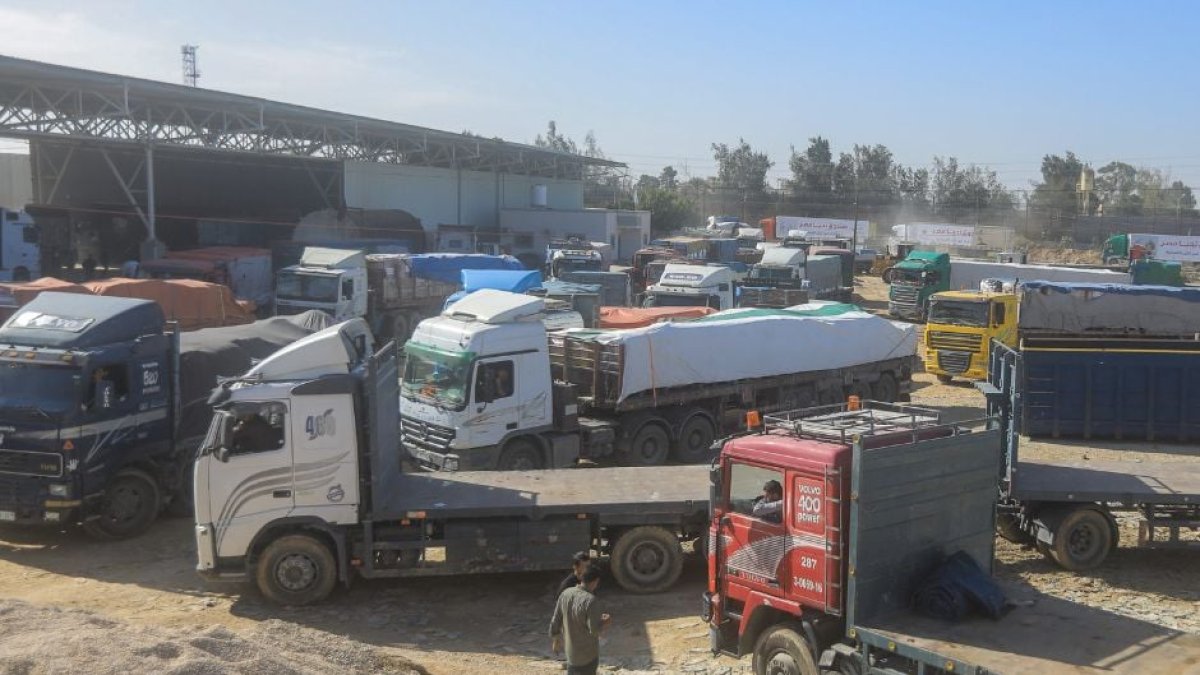A study reveals that there is not a hunger problem in Gaza
The study, conducted by Israeli professors, confirms that food aid brought to the Strip through Israel meets international standards.

Varios camiones de ayuda humanitaria en Gaza. (Cordon Press)
A new study conducted by Israeli researchers from the Hebrew University of Jerusalem and Ben Gurion University shows that humanitarian aid delivered to residents of the Gaza Strip through Israel meets international standards, according to the Israeli newspaper Ynet.
The results of the study, which was based on data regarding aid sent from January to April 2024, contrast with the international community’s concern about a serious humanitarian crisis in the Gaza Strip, which could lead to famine.
This Wednesday, the U.N. presented a report indicating that around 1,000,000 Palestinians could suffer from severe hunger by the middle of next month if the fighting continues. The report also criticized what it described as restrictions on aid and the collapse of the food system.
The study, led by Professor Aron Troen, from the Faculty of Nutrition Sciences of the Faculty of Agriculture, Food and Environment of the Hebrew University of Jerusalem, and Dr. Dorit Nitzan, from the Faculty of Public Health of the University Ben Gurion, refutes those who claim that there is famine and a serious humanitarian crisis in Gaza.
Among other things, the results show that in the period from January to April of this year there was a continuous 53% increase in the amount of food transported to Gaza. In addition, the food Israel brought to the Strip was found to meet per capita nutritional security requirements, as stipulated in the Sphere Standards, the recognized international standard regarding the nutrition of disadvantaged populations in war zones.
The Coordinator of Government Operations in the Territories, the Israeli group that deals with civil issues between the Israeli government, the IDF, international organizations, diplomats and the Palestinian Authority, allowed 14,916 trucks into the Gaza Strip. These trucks transported 227,854 tons of food to the Gaza Strip, which is an average of 3,729 trucks per month or 124 per day.
The study also indicates that the weight of food shipments to the Strip increased by 57% from January to April. As for the products themselves, in the same time period there were significant increases in shipments of specific food groups such as nuts and seeds (an increase of 1,435%), fruits (2,851%), vegetables (2,657%), dairy products and eggs (934%), potatoes (662%), and chicken, fish and meat (97%).
The research also highlights that the average nutritional availability per person per day was 3,374 calories; 101 grams of protein (12.1% of energy), 80.6 grams of fat (21.5% of energy) and 25.2 milligrams of iron. This data complies with the Sphere Standards and with the recommendations for daily nutritional intake for the needs of the population.
"Israel fulfills its commitment to allow the transfer of adequate nutritional aid to the population of Gaza"
Dr. Dorit Nitzan stated that "despite these findings, the distribution of food among the population and their access to relief resources must continue to be evaluated. It is important that this work continues to be guided by reliable and transparent data to ensure adequate nutritional assistance and care for the health of Gazans.”
Professor Aron Troen explained that "the best way to ensure the nutrition of citizens and respond to complaints against Israel is through reliable facts and data. Our findings clearly show that Israel fulfills its commitment to allow the transfer of adequate nutritional aid to the population of Gaza." He concluded, "The results of our research emphasize the importance of using established information and empirical data instead of unfounded accusations, to ensure the success of humanitarian efforts, especially when dealing with sensitive situations in areas of conflict. Continuous monitoring of developments on the ground is essential so that all humanitarian agencies can continue to provide and distribute the necessary aid to the population."

























